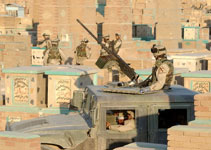|
Najaf Peace Deal Sees Light
 |
|
Sadr militiamen were ordered to lay down arms (AFP)
|
NAJAF,
August 27 (IslamOnline.net & News Agencies) - Shiite leader
Muqtada Al-Sadr ordered his militiamen to disarm and leave Imam Ali
Shrine in Najaf, as part of a deal that also calls for US forces to
withdraw from the holy city.
The
deal was brokered by
Iraq
's most revered religious leader, Grand Ayatollah Ali Al-Sistani who
made a dramatic return to Najaf and persuaded Sadr to accept his peace
initiative after an intense day in which at least 76 Iraqis were
killed in mortar attacks Thursday, August 26.
"Moqtada
Sadr calls on his supporters to leave the Imam Ali shrine with the
demonstrators at
10:00 am
(0600 GMT)... and to disarm," said the appeal through
loudspeakers, reported Agence France-Presse (AFP) Friday, August 27.
Iraq
's government said it had also agreed to the deal, under which
US
forces will also pull out of the city and Najaf will be declared a
weapon-free zone.
Also
under the five-point plan, Iraqi police would resume responsibility
for security, law and order in the two cities (Najaf and Kufa) and the
interim government would compensate those who have suffered in the
weeks of heavy fighting.
Early
Friday, US troops were no longer visible in the holy city, an AFP
reporter said.
A
large crowd arrived in the Old City of Najaf by the south gate and was
heading calmly toward the shrine where many pilgrims were already
stationed.
Sistani
had signaled that he wants all armed groups to disarm and leave Najaf
and Kufa, along with all foreign troops.
Shortly
after the announcement of a peace deal, Sadr's top political adviser,
Ali Sumeisim, was released, one day after his arrest by police in
Najaf.
Sistani
had also called on Iraq's interim government to allow the
"millions" who accompanied him on his journey to Najaf enter
the Imam Ali shrine before leaving by 10:00 am Friday - a request that
Baghdad agreed to within hours.
"This
is part of the solution to the crisis. The atmosphere is positive...
and the crisis is about to be resolved," Sistani spokesman Hamid
Khaffaff said late Thursday.
Many
pilgrims, supporters of Sistani, were overcome with emotion at the
mosque. Some kissed the ornate walls inside the shrine and wept after
they queued to get in.
Venting
Anger

|
|
Under the deal, SU troops are also to leave Najaf (AFP) |
However,
as the deadline passed, dozens of armed men were still inside. Others
outside brandished AK-47 assault rifles and rocket propelled grenades.
Dozens
of Mehdi fighters militiamen had taken off their black military
fatigues and changed into civilian clothing.
Teenage
fighters spilled over the alleyways leading to the gold-domed mosque.
Many smiled and said to the visitors as they flowed in: "Welcome
pilgrims to the shrine."
But
after bitter fighting with US marines that killed hundreds and in the
wake of ferocious American bombardments, some Mehdi members still
wanted to vent their fury, according to Reuters.
"We
will support whatever Ayatollah Sistani and Sayyed Moqtada have
agreed. But we will still slit the throats of the Americans,"
said one militiaman, Hussein Taama.
Some
fighters wrapped heavier weapons such as mortar launchers and
rocket-propelled grenades in canvas before secreting them away in safe
houses in the
Old
City
, according to AFP.
Sadr’s
aides remain defiant after the deal brokered by Sistani.
"The
Americans thought that they could exterminate the Mehdi Army, but our
fighters are still here. They will be able to go back to their work
whilst remaining an army," said Ahmad Al-Shaibani, a top aide of
Sadr.
After
a deal in June that ended Sadr's first wave of clashes of US-led
occupation troops, militiamen hid their weapons. Fighting broke out
again two months later.
"What's
clear is that all the weapons will remain in the control of the Mehdi
Army," said Hassan, who had just disposed of his arsenal.
"We are ready to take them back if the situation
deteriorates."
US
tanks were still parked in Najaf's vast cemetery and some
US
snipers were still able to shoot across the eastern gate of the
mausoleum.
A
dozen bullet holes were visible in the golden dome of the mausoleum
and some of its 7,777 golden tiles had come loose due to the
US
military shelling, said an AFP correspondent.
Italian
Executed
The
peace deal in Najaf was, however, marred by reports that a group
calling itself the Islamic Army in
Iraq
executed Italian reporter Enzo Baldoni, held captive for a week after
Rome
refused to withdraw its soldiers from the country within 48 hours,
Al-Jazeera television reported.
In
a message of condolence to the journalist's wife and two children,
Italian Prime Minister Silvio Berlusconi slammed the death as
returning us "to the dark times of barbarism".
Scores
of foreigners have been taken hostages in
Iraq
in the last five months. Most have been released but several have been
killed.
Muslim
scholars have strongly condemned the similar beheading of an American
civilian by unknown people in
Iraq
, saying Islam
stands against such acts.
Muslims
are demanded to treat their non-Muslim captives with clemency.
Elsewhere
Friday morning, at least 10 Iraqis were wounded when a car bomb blew
up in the path of a
US
military convoy in the main northern city of
Mosul
, medical sources said.
The
explosion struck at around
11:00 am
(0700 GMT) in the central Yarmuk district of the city.
|